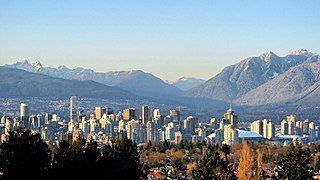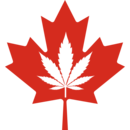
Marc Scott Emery is a Canadian cannabis rights activist, entrepreneur and politician. Often described as the "Prince of Pot", Emery has been a notable advocate of international cannabis policy reform, and has been active in multiple Canadian political parties at the provincial and federal levels. Emery has been jailed several times for his cannabis activism.

Greater Vancouver, also known as Metro Vancouver, is the metropolitan area with its major urban centre being the city of Vancouver, British Columbia, Canada. The term "Greater Vancouver" describes an area that is roughly coterminous with the region governed by the Metro Vancouver Regional District (MVRD), though it predates the 1966 creation of the regional district. It is often used to include areas beyond the boundaries of the regional district but does not generally include wilderness and agricultural areas that are included within the MVRD.

South Asian Canadians are Canadians who were either born in or can trace their ancestry to the Indian subcontinent, which includes the nations of India, Pakistan, Bangladesh, Nepal, Sri Lanka, Bhutan, and the Maldives.
The BC Liquor Distribution Branch (BCLDB) is the governmental body responsible for distributing alcohol and cannabis products in the province of British Columbia, Canada. The BCLDB operates under the Ministry of Finance and was established in 1921. The BCLDB head office is located in Burnaby, with distribution centres in Delta and Kamloops.

Cannabis in Canada is legal for both recreational and medicinal purposes. Medicinal use of cannabis was legalized nationwide under conditions outlined in the Marihuana for Medical Purposes Regulations, later superseded by the Access to Cannabis for Medical Purposes Regulations, issued by Health Canada and seed, grain, and fibre production was permitted under licence by Health Canada. The federal Cannabis Act came into effect on October 17th, 2018 and made Canada the second country in the world, after Uruguay, to formally legalize the cultivation, possession, acquisition, and consumption of cannabis and its by-products. Canada is the first G7 and G20 nation to do so.

Jodie Emery is a Canadian cannabis rights activist and politician. She is the spouse of fellow activist Marc Emery. Until the business was shut down by police, the couple were co-owners of Cannabis Culture, a business that franchised pot dispensaries, later deemed to be illegal. They had obtained the cannabis from illegal sources, according to Crown prosecutors. They are the former operators and owners of Cannabis Culture magazine and Pot TV.

Dana Albert Larsen is a Canadian author, businessman, philanthropist and activist for cannabis and drug policy reform. Larsen currently operates businesses and non-profit societies in Vancouver including The Medicinal Cannabis Dispensary, The Medicinal Mushroom Dispensary, The Coca Leaf Cafe, Pothead Books, and the Get Your Drugs Tested centre.

Canada's drug regulations are measures of the Food and Drug Act and the Controlled Drugs and Substances Act. In relation to controlled and restricted drug products, the Controlled Drugs and Substances Act establishes eight schedules of drugs and new penalties for the possession, trafficking, exportation and production of controlled substances as defined by the Governor-in-Council. Drug policy of Canada has traditionally favoured punishment for the smallest of offences, but this convention was partially broken in 1996 with the passing of the Controlled Drugs and Substances Act.

The Cannabis Act (C-45) of June, 2018 paved the way for the legalization of cannabis in Canada on 17 October 2018. Police and prosecution services in all Canadian jurisdictions are currently capable of pursuing criminal charges for cannabis marketing without a licence issued by Health Canada. The Supreme Court of Canada has held that the federal Parliament has the power to criminalize the possession of cannabis and that doing so does not infringe upon the Canadian Charter of Rights and Freedoms. The Ontario Court of Appeal and the Superior Court of Ontario have, however, held that the absence of a statutory provision for medical marijuana is unconstitutional, and to that extent the federal law is of no force and/or effect if a prescription is obtained. The recreational use of cannabis has been legalized by the federal government, and took effect on 17 October 2018.

The Cannabis Act is a law which legalized recreational cannabis use in Canada in combination with its companion legislation Bill C-46, An Act to Amend the Criminal Code. The law is a milestone in the legal history of cannabis in Canada, alongside the 1923 prohibition.

Cannabis in Alberta became legalized on October 17, 2018 following the coming into force of federal Bill C-45. Production, distribution and consumption of cannabis had been prohibited in Canada since 1923. While some other provinces distribute cannabis through publicly owned retail monopolies, Alberta allows private companies to sell cannabis at licensed retail storefronts and online. Private retailers must purchase cannabis from the provincial wholesaler, the AGLC. Originally, the Alberta government was the sole entity permitted to retail cannabis online within the province but as of March 8, 2022, private retailers are permitted to do so and the province has since exited the retail business.

Cannabis in Ontario is legal for both medical and recreational purposes. Cannabis in Canada has been legal for medicinal purposes since 2001 under conditions outlined in the Access to Cannabis for Medical Purposes Regulations, issued by Health Canada, while seed, grain, and fibre production are permitted under licence. The federal Cannabis Act, legalizing cannabis for recreational use, came into effect on 17 October 2018.

Cannabis in Quebec became legal when the national Cannabis Act went into force on 17 October 2018. Cannabis in Canada has been legal for medicinal purposes since 2001 under conditions outlined in the Marihuana for Medical Purposes Regulations, later superseded by the Access to Cannabis for Medical Purposes Regulations, issued by Health Canada and seed, grain, and fibre production was permitted under licence by Health Canada.

Cannabis in New Brunswick became legal for recreational use when the Cannabis Act went into force across the country on October 17, 2018.

On October 17, 2018, cannabis was legalized in Canada for recreational and medical purposes. It was already legal for medicinal purposes, under conditions outlined in the Marihuana for Medical Purposes Regulations issued by Health Canada, and for seed, grain, and fibre production under licence by Health Canada.

Cannabis in Prince Edward Island became legal when the national Cannabis Act went into force on October 17, 2018.

Cannabis has been legal in Nova Scotia and the entire country of Canada since October 17, 2018, the effective date of the Cannabis Act. Each province and territory set its own laws for various aspects, such as the legal age, whether householders can grow cannabis and the method of retail sales. Cannabis has been legal in Canada for medicinal purposes since 2001 under conditions outlined in the Marihuana for Medical Purposes Regulations, later superseded by the Access to Cannabis for Medical Purposes Regulations, issued by Health Canada and seed, grain, and fibre production was permitted under licence by Health Canada.

Non-medical cannabis in Manitoba became legal when the national Cannabis Act went into force on October 17, 2018.

Cannabis in Newfoundland and Labrador became legal when the national Cannabis Act went into force on October 17, 2018.

Cannabis in Saskatchewan became legal when the national Cannabis Act went into force on 17 October 2018.












